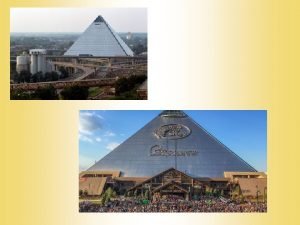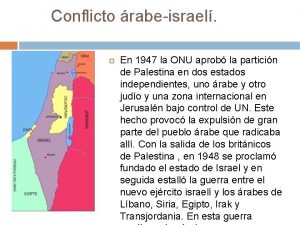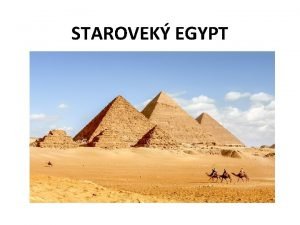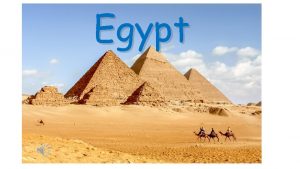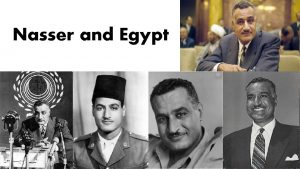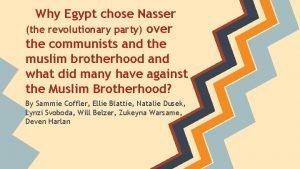Nasser and Egypt Group 4 Richelle Martens Emma














- Slides: 14

Nasser and Egypt: Group 4 Richelle Martens, Emma Jones, Rachel Jones, Adrian Hinkle and Corinne Kelley

Nasser

Egypt Map and Flag

Opposition

Nasserism “Aimed at improving the lives of ordinary people while being anti-imperialist and firmly against external involvement in Egyptian policy-making. ” Described as a system of personal rule. Pearson page 243

Foreign Policies Yemeni Civil War The Six Day War During the civil war in Yemen Nasser sent in Egyptian troops in attempt to shore up the Yemen Arab Republic. By 1963 15, 000 Egyptian soldiers were based in Yemen to fight the civil war. Pearson page 239 On June 5 1967 an air attack was launched on air bases in Egypt, Jordan, and Syria. Nasser offered his resignation on June 9, but then withdrew it the next day. Nasser turned to the USSR to help rebuild Egypt’s army and beg for fire arms.

Political/Economical Impact of War Political Impact There was a disastrous outcome of the “ Six Day War”. Nasser fired his Chief of Staff, Abdek Hakim Amer and 50 other commanders. Sept 1970 , there was a successful hijacking of three commercial airlines by the Popular Front for the Liberation of Palestine (PELP). Nasser responded from this international crisis by breaking “Negotiations between King Hussein of Jordan and Yasser Arafat of the Palenstine Liberation Organization (PLO)” (241). “Nasser, already suffering from heart problems aggravate by diabetes, died late in the evening of 28 September 1970” (241. ) Pearson pages 240 and 241 Economical Impact The Egyptian economy was not terribly affected by the Sixth day war. By 1969, there was a discovery of new oil fields, increasing the production to 14 million metric tons. “There was an increase in world prices for cotton and a fall in the price of wheat also helped the trade balance “ (241). Nasser tried to keep inflation under control. He made cuts in government expenditure by subsidizing food prices. Nasser created new limits for acreage ownership. Individuals had 20 hectares and familes had 40 hectares.

Social Policies : Education Nasser Knew that when Egypt’s literacy rate improved, his political reform would improve. If a population was educated, they would support and follow his political aspirations. - Primary schooling was required. - He changed curriculum to emphasize science and technology. (Nasser intended to modernize Islam) - University tuition was free. • Pearson page 243

Social Policies: The Role of Women • In this time, women were given new rights: Ø The veil was banned, and they were allowed to show their faces Ø Given access to better education and new professions were available to them. Ø The National Charter Pledge was added to recognize the equality of women. • In Cairo and Alexandria (the two main cities), the role of women was quite similar to the role of women in Europe and America. • In Upper Egypt and the countryside, women still lived traditionally, and young girls were still pulled from school at a young age. • Overall, the number of children receiving a primary school education grew substantially. • The number of women receiving higher education grew substantially as well. • Pearson page 244

Social Policies: Religion • • • Nasser was Muslim Believed it impossible to run the state on the basis of the Koran Considered a “modernist”, believing that Muslims could allow new technology and social policies while maintaining their Islamic beliefs There were multiple attempts by the Muslim Brotherhood to overthrow the government and assassinate Nasser; they passed a death sentence on him in 1965 Nasser viewed them as a threat, as they were against socialist policies, women’s rights and other aspects of the revolution; he would not compromise Many of them were imprisoned and tortured, and were tracked down by secret police mukhabarat Pearson page 244 http: //en. wikipedia. org/wiki/Muslim_brotherhood

Social Policies: Media & Culture Egyptian newspapers came under state ownership in 1960. Censorship was strict. Nasser’s best friend Mohammad Heikal was editor of a national newspaper. The film industry was nationalized in 1963 and class struggle became theme of most films. Pearson pages 244 and 245

External Opposition Prime Minister Nur al-Said of Iraq viewed Nasser as a dangerous rival The king of Jordan also viewed him as a threat The 1957 Eisenhower Doctrine from the U. S. declared that communism was a major threat in the Middle East, and likely suspected that Egypt had ties to the USSR U. S. offered aid to those who could “resist communist encroachment” Pearson pages 245 and 246

Internal Opposition The Communists The communists considered Nasser to be un-socialist. Nasser maintained a cruel policy of suppression towards the communists. Convinced receiving aide from the Soviet Union would lead to becoming dependent. Nasser carried out a purge against the Egyptian Communist Party (280 of its leaders were arrested and imprisoned). Pearson pages 246 and 247 The Muslim Brotherhood Considered Nasser un-Islamic. After an attempt on Nasser’s life (1954), he was tougher on the Muslim Brotherhood. They opposed women’s right, socialist policies and secularization. Nasser refused to compromise with the Muslim Brotherhood, and refused to promote and form political Islam.

Nasser Legacy A strong nationalist but also viewed Egypt within the context of the Middle East. Attempted many times to united the Middle Eastern countries Under Nasser’s rule Egypt moved from the British sphere of influence to the USA to the USSR. Attempted to improve lives of the impoverished masses, but had a hard time due to a weak economy and limited education. Created a bureaucracy and a new class of mangers and administrators in an attempt to nationalize and democratize Egypt. His plans were always met with opposition. The economy never did seem to improve, many of the poorest classes suffered from poor health. Despite this Nasser remained overwhelmingly popular. His death in 1970 was mourned throughout the Arab world. Pearson page 247





